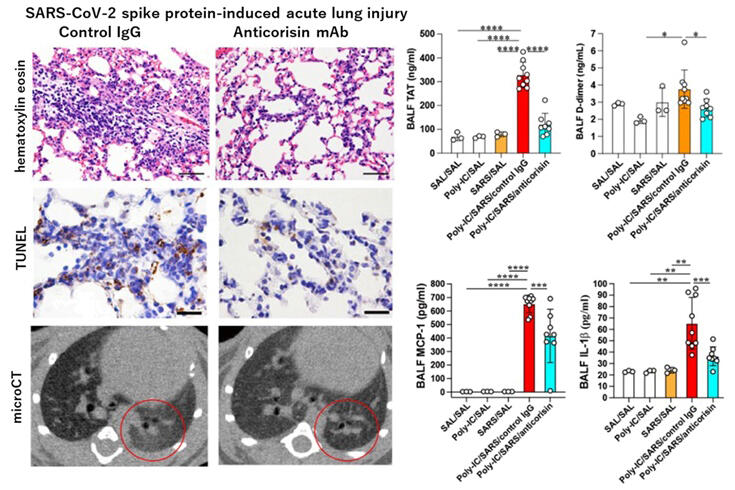A research group led by Assistant Professor Taro Yasuma and Professor Esteban C. Gabazza of the Department of Immunology, the Graduate School of Medicine at Mie University has found that blood levels of corisin, a bacterium-derived peptide that induces cell death, are increased in patients with COVID-19 and positively correlated with blood coagulation markers. This discovery was made by measuring corisin and coagulation-related markers in the blood of patients diagnosed with the disease. They confirmed that administration of a corisin-neutralizing monoclonal antibody ameliorated the pathological conditions in a COVID-19-induced acute lung injury mouse model. The results are expected to contribute to the development of treatments for acute lung injury and blood coagulation abnormalities that occur in severe cases of COVID-19. The work was published in the March 5 issue of Journal of Thrombosis and Haemostasis, an international academic journal.

Provided by Mie University
Patients with severe COVID-19 are known to develop acute lung injury (ALI), which can cause fatal respiratory failure, and frequently develop blood coagulation abnormalities with a high incidence of thrombosis. Recently, microbiota was reported to be associated with exacerbation of COVID-19, but the detailed mechanism behind this remained unknown.
Previously, the research group had discovered corisin, a peptide produced by Staphylococcus spp. isolated from mouse lung tissue, and showed that the peptide-induced cell death of alveolar epithelial cells is associated with accelerated fibrosis and acute exacerbation of lung fibrosis. They have also shown that inhibition of the peptide improved the symptoms in a mouse model of ALI caused by airway administration of lipopolysaccharide and subcutaneous administration of bleomycin.
In the present study, they studied whether corisin was involved in the pathophysiology of COVID-19. First, corisin and coagulation-related markers were measured in blood samples from 47 patients diagnosed with COVID-19 based on positive PCR test results and compared with the blood levels in healthy controls. The results showed that corisin levels in the patients' blood samples were elevated and may be positively correlated with and involved in a tissue factor, TAT, and D-dimer, which are markers of blood coagulation.
Next, they administered a corisin-neutralizing monoclonal antibody in a mouse model of ALI and tested the effect. This mouse model was created by intra-airway administration of the spike protein of SARS-CoV-2, the virus that causes COVID-19, and poly I:C, a component of the virus. The results showed that the monoclonal antibody-treated mice had reduced lung cell death, inflammation, and thrombus formation and improved pathological conditions compared with those of the control group.
To further clarify the mechanism by which corisin causes coagulation abnormalities, vascular endothelial cells and alveolar epithelial cells were treated with corisin, and the activity of coagulation-related factors on the cell surface was examined. Consequently, the activity of tissue factor, a coagulation initiator, was enhanced, whereas the activity of thrombomodulin, which inhibits coagulation, was decreased. Moreover, these responses were inhibited by the corisin-neutralizing antibody. Through this the research team successfully demonstrated the mechanism by which corisin promotes coagulation via activation of tissue factor and inactivation of thrombomodulin.
Yasuma said, "Although COVID-19 is now classified as a category 5 infectious disease and public interest in COVID-19 is waning, people with underlying medical conditions and older adults still require caution because they are prone to exacerbation. In this study, we have shown that a substance released from resident bacteria in the human body promotes thrombosis and is involved in the exacerbation of COVID-19. Because effective treatments are limited for severe COVID-19, we are going to continue our research to develop new treatments."
Journal Information
Publication: Journal of Thrombosis and Haemostasis
Title: Role of microbiota-derived corisin in coagulation activation during SARS-CoV-2 infection
DOI: 10.1016/j.jtha.2024.02.014
This article has been translated by JST with permission from The Science News Ltd. (https://sci-news.co.jp/). Unauthorized reproduction of the article and photographs is prohibited.




